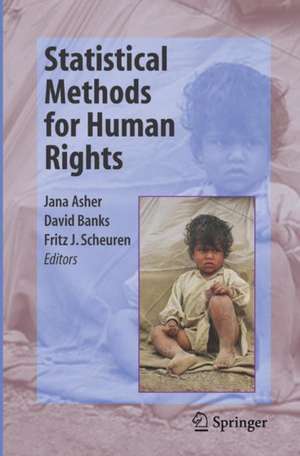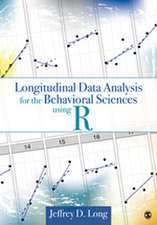Statistical Methods for Human Rights
Editat de Jana Asher, David Banks, Fritz J. Scheurenen Limba Engleză Paperback – 14 dec 2007
Statistics is central to the modern perspective on human rights. It allows researchers to measure the effect of health care policies, the penetration of educational opportunity, and progress towards gender equality. The new wave of entrepreneurial charities demands impact assessments and documentation of milestone achievement. Non-governmental organizations need statistics to build cases, conduct surveys, and target their efforts.
This book describes the statistics that underlie the social science research in human rights. It includes case studies, methodology, and research papers that discuss the fundamental measurement issues. It is intended as an introduction to applied human rights research.
Preț: 392.21 lei
Nou
Puncte Express: 588
Preț estimativ în valută:
75.05€ • 78.56$ • 62.46£
75.05€ • 78.56$ • 62.46£
Carte tipărită la comandă
Livrare economică 31 martie-14 aprilie
Preluare comenzi: 021 569.72.76
Specificații
ISBN-13: 9780387728360
ISBN-10: 0387728368
Pagini: 339
Ilustrații: XXI, 339 p.
Dimensiuni: 155 x 235 x 17 mm
Greutate: 0.51 kg
Ediția:2008
Editura: Springer
Colecția Springer
Locul publicării:New York, NY, United States
ISBN-10: 0387728368
Pagini: 339
Ilustrații: XXI, 339 p.
Dimensiuni: 155 x 235 x 17 mm
Greutate: 0.51 kg
Ediția:2008
Editura: Springer
Colecția Springer
Locul publicării:New York, NY, United States
Public țintă
ResearchCuprins
Statistical Thinking on Human Rights Topics.- The Statistics of Genocide.- Why Estimate Direct and Indirect Casualties from War? The Rule of Proportionality and Casualty Estimates.- Statistical Thinking and Data Analysis: Enhancing Human Rights Work.- Recent Projects.- Hidden in Plain Sight: X.X. Burials and the Desaparecidos in the Department of Guatemala, 1977–1986.- The Demography of Conflict-Related Mortality in Timor-Leste (1974–1999): Reflections on Empirical Quantitative Measurement of Civilian Killings, Disappearances, and Famine-Related Deaths.- Afghan Refugee Camp Surveys in Pakistan, 2002.- Metagora: An Experiment in the Measurement of Democratic Governance.- History and Future Possibilities.- Human Rights of Statisticians and Statistics of Human Rights: Early History of the American Statistical Association’s Committee on Scientific Freedom and Human Rights.- Obtaining Evidence for the International Criminal Court Using Data and Quantitative Analysis.- New Issues in Human Rights Statistics.- Statistics and the Millennium Development Goals.- A FinalWord of Warning.- Using Population Data Systems to Target Vulnerable Population Subgroups and Individuals: Issues and Incidents.
Recenzii
From the reviews:
"A good compilation of representative work in the area of large-scale human rights violations. It offers interested readers the background knowledge needed to understand some historical events, as well as some successful applications or new developments in addressing the analysis of these types of events. Although written more for statisticians and social scientists interested in documenting and detecting human rights violations, this book can be useful reading for those more interested in ethical or political advocacy for known victims of these violations." (Francis C. Staskon, PsycCRITIQUES, Vol. 53 (39), 2008)
"This book describes the statistics that underlie the social science research in human rights. It includes case studies, methodology, and research papers that discuss the fundamental measurement issues. It is intended as an introduction to applied human rights research." (Alette Smeulers and Lotte Hoek, Criminology and International Crimes Newsletter, 3, 1, p.6)
"The book is full of interesting and useful examples to use when teaching statistics, particularly for the social science students. The chapters contain a summary/conclusion at the end and a wealth of references for the reader to pursue.… A useful book with statistics that helps researchers in their approach to present and measure human rights issues with clarity. (Susan Starkings, International Statistical Review, 76, 2, p. 328)
"While the stories are fascinating, the book also contains a remarkable collection of innovative methods, most likely applicable to many other topics.... They advocate the development of new statistical techniques to estimate program impacts;... encompassing the larger topics of evidence-based decision-making. Their bibliography and listing of Web resources is extensive.... (Douglas Samuelson, ORMS Today, 35, 1, p. 36-39)
"This collection of 13 articles(chapters) by 29 authors provides, from a statistician’s vantage point, a historical overview plus a contemporary snapshot of international human-rights issues. … For a novice, the book may also serve as a general introduction to historical, organizational, and conceptual human rights matters; for an expert, it is a fine general reference work … . Everyone interested in the statistics of human rights needs a copy of this work." (Paul L. Zador, Journal of the American Statistical Association, Vol. 103 (484), December, 2008)
"A good compilation of representative work in the area of large-scale human rights violations. It offers interested readers the background knowledge needed to understand some historical events, as well as some successful applications or new developments in addressing the analysis of these types of events. Although written more for statisticians and social scientists interested in documenting and detecting human rights violations, this book can be useful reading for those more interested in ethical or political advocacy for known victims of these violations." (Francis C. Staskon, PsycCRITIQUES, Vol. 53 (39), 2008)
"This book describes the statistics that underlie the social science research in human rights. It includes case studies, methodology, and research papers that discuss the fundamental measurement issues. It is intended as an introduction to applied human rights research." (Alette Smeulers and Lotte Hoek, Criminology and International Crimes Newsletter, 3, 1, p.6)
"The book is full of interesting and useful examples to use when teaching statistics, particularly for the social science students. The chapters contain a summary/conclusion at the end and a wealth of references for the reader to pursue.… A useful book with statistics that helps researchers in their approach to present and measure human rights issues with clarity. (Susan Starkings, International Statistical Review, 76, 2, p. 328)
"While the stories are fascinating, the book also contains a remarkable collection of innovative methods, most likely applicable to many other topics.... They advocate the development of new statistical techniques to estimate program impacts;... encompassing the larger topics of evidence-based decision-making. Their bibliography and listing of Web resources is extensive.... (Douglas Samuelson, ORMS Today, 35, 1, p. 36-39)
"This collection of 13 articles(chapters) by 29 authors provides, from a statistician’s vantage point, a historical overview plus a contemporary snapshot of international human-rights issues. … For a novice, the book may also serve as a general introduction to historical, organizational, and conceptual human rights matters; for an expert, it is a fine general reference work … . Everyone interested in the statistics of human rights needs a copy of this work." (Paul L. Zador, Journal of the American Statistical Association, Vol. 103 (484), December, 2008)
Textul de pe ultima copertă
Human rights issues are shaping the modern world. They define the expectations by which nations are judged and affect the policy of governments, corporations, and foundations. They have set the agenda in prosecutions at the International Criminal Court at the Hague, funding decisions by the International Monetary Fund, and corporate expansion programs by multinationals.
Statistics is central to the modern perspective on human rights. It allows researchers to measure the effect of health care policies, the penetration of educational opportunity, and progress towards gender equality. The new wave of entrepreneurial charities demands impact assessments and documentation of milestone achievement. Non-governmental organizations need statistics to build cases, conduct surveys, and target their efforts.
This book describes the statistics that underlie the social science research in human rights. It includes case studies, methodology, and research papers that discuss the fundamental measurement issues. It is intended as an introduction to applied human rights research.
The editors of the book are Jana Asher, David Banks, and Fritz Scheuren. Jana Asher led the first national human rights survey in Sierra Leone and provided statistical support for surveys in Iraq, Kosovo, East Timor and Peru. She is the former Senior Program Associate in the Science and Human Rights Program at the American Association for the Advancement of Science. David Banks is a professor of statistics at Duke University, Fellow of the American Statistical Association, recipient of the Roger Herriott Award, and currently editor of the Journal of the American Statistical Association. Fritz Scheuren is the past-president of the American Statistical Association, a Fellow of the ASA, and Vice-President of Statistics at the National Opinion Research Center at the University of Chicago. He has done human rights statistics in Kosovo, Afghanistan, Peru, Guatemala, East Timor and Columbia, and he advises the Country of Georgia on their Millennium Challenge proposal.
Statistics is central to the modern perspective on human rights. It allows researchers to measure the effect of health care policies, the penetration of educational opportunity, and progress towards gender equality. The new wave of entrepreneurial charities demands impact assessments and documentation of milestone achievement. Non-governmental organizations need statistics to build cases, conduct surveys, and target their efforts.
This book describes the statistics that underlie the social science research in human rights. It includes case studies, methodology, and research papers that discuss the fundamental measurement issues. It is intended as an introduction to applied human rights research.
The editors of the book are Jana Asher, David Banks, and Fritz Scheuren. Jana Asher led the first national human rights survey in Sierra Leone and provided statistical support for surveys in Iraq, Kosovo, East Timor and Peru. She is the former Senior Program Associate in the Science and Human Rights Program at the American Association for the Advancement of Science. David Banks is a professor of statistics at Duke University, Fellow of the American Statistical Association, recipient of the Roger Herriott Award, and currently editor of the Journal of the American Statistical Association. Fritz Scheuren is the past-president of the American Statistical Association, a Fellow of the ASA, and Vice-President of Statistics at the National Opinion Research Center at the University of Chicago. He has done human rights statistics in Kosovo, Afghanistan, Peru, Guatemala, East Timor and Columbia, and he advises the Country of Georgia on their Millennium Challenge proposal.
Caracteristici
Brings together a collection of papers on statistics and human rights No other book on the market addresses this subject matter















